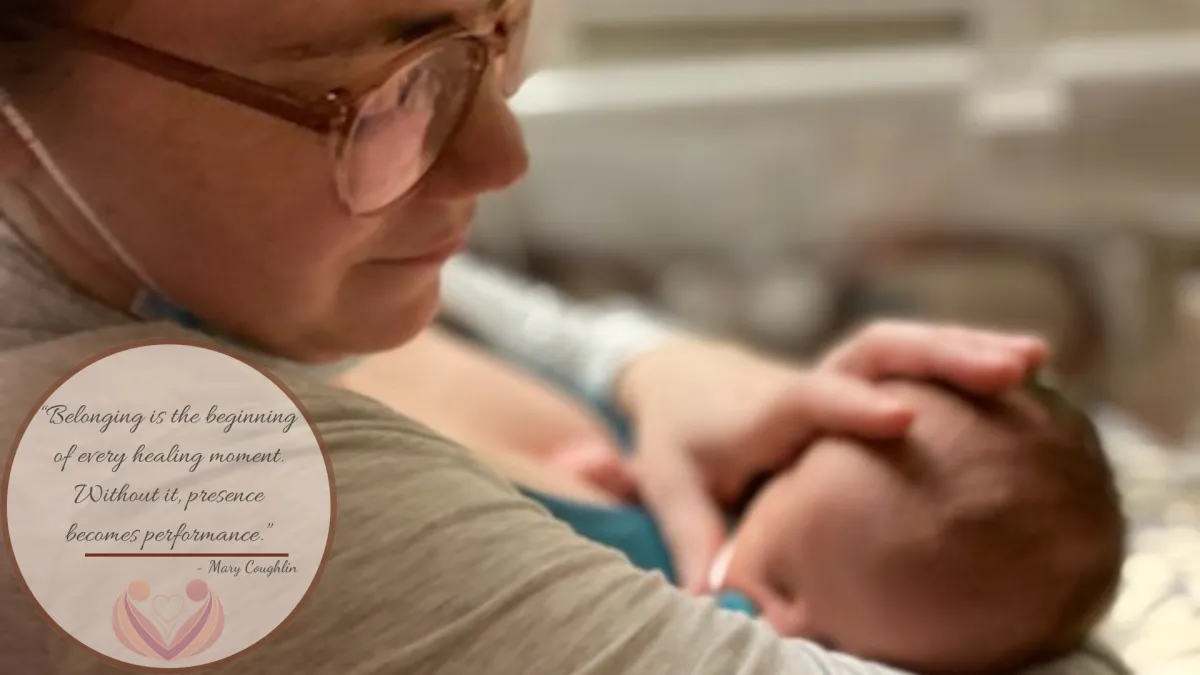
Belonging Across Worlds
“Belonging is the beginning of every healing moment. Without it, presence becomes performance.” – Mary Coughlin
When we speak of presence, one of the first questions we must ask is:
Do I feel like I belong here?
Belonging is more than being included. It’s being known. It’s walking into a room—clinical, civic, spiritual—and not shrinking, bracing, or bending yourself to fit.
In the NICU, we speak often of family-centered care. But the deeper question is:
Do families feel they belong in this space built for science and survival?
Do clinicians feel they belong in a system that treats them like cogs, not caregivers?
Do you feel you belong in your own life, in your profession, in this moment in history?
Belonging in TIDC
In the context of Trauma-Informed Developmental Care, belonging is embedded in every principle and every interaction.
It’s in how we:
Invite families into decision-making, not just visitation.
Validate a baby’s behavioral cues as communication.
Make space for a colleague’s grief instead of rushing toward "professionalism."
Belonging creates relational safety—which is the foundation for co-regulation and healing.
Caring Science: Belonging as Sacred Encounter
Jean Watson teaches us that caring is not transactional—it is transcendent.
When we recognize the sacredness in another, we affirm their right to be.
Belonging, then, is not just a social need. It’s a soul need. And in moments of presence, we restore it.
BUFFER: The B is for Belonging
The very first letter of the BUFFER framework reminds us:
If we don’t belong, we cannot begin.
Belonging is the ground under our feet. It’s what trauma tries to sever—and what presence rebuilds.
Whether we’re talking about NICU rounds, school board meetings, or systemic injustice, the question remains:
Who feels like they don’t belong here, and what will I do about it?
From Clinical to Civic
Belonging is also deeply political.
Policies that marginalize, criminalize, or dehumanize are trauma-informing in the worst way.
When we center belonging in care, in governance, in education—we create a trauma-informed society, not just a trauma-informed NICU.
Belonging is how we bring people back from the margins.
An Invitation to Reflect
Take a few quiet minutes this week to sit with this:
Where in your life do you feel a deep sense of belonging?
Where do you feel like you’re pretending, performing, or proving?
Let this reflection be a gentle call home.
A Workshop Rooted in Belonging
If this post resonates, I hope you’ll consider joining me on
Friday, June 6th for The Presence—a virtual workshop for clinicians, educators, and change-makers ready to reclaim healing moments in a fractured world.
🌀 The Presence: Reclaiming the Healing Moment
🗓️ Friday, June 6 | 11am–3pm ET | 4 CE credits
💻 Live, reflective, soul-fueled learning
🔗 Workshop details + early registration here
With presence and purpose,
Mary
Weave on, my friend. 🌿
P.S. If this stirred something in you, you’re warmly invited to join me for The Presence on June 6th—our space to reflect, reconnect, and reimagine care together.
